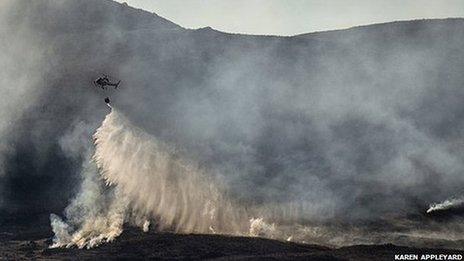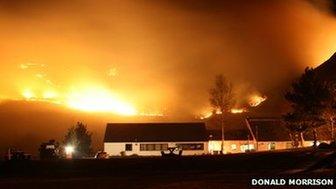Fears for golden eagle nests as wildfires sweep Highlands
- Published

The Wester Ross fire is burning on two fronts, and has destroyed an area of around 14 sq km
Dozens of golden eagle eggs and other rare bird nests may have been destroyed in Highland wildfires, experts warned.
RSPB Scotland said it was seriously concerned about the impact on the species, which nests in open moorland.
There have been almost 200 wildfires in the Highlands over the past week, with fire crews still battling a large blaze in Wester Ross.
There are also concerns for thousands of migrant birds that are due to nest in the area in the next few weeks.
There are thought to be about 400 golden eagles in Scotland, mainly in the Highlands.
James Reynolds, of the RSPB, said the loss of nests could have a devastating impact on the population.
"It is absolutely certain that we will have lost a number of golden eagle nests," he said. "How many we don't know, but for a population that small, even the loss of one nest is serious.
"The loss of double figures will potentially have a huge impact.
"Numbers are already very low, this will just hold them back further."
The RSPB has sent experts to the Highlands to try to assess the extent of the damage.
Mr Reynolds added that white-tailed eagle eggs may also be at risk, as well as those of migrant birds such as short-eared owls, dotterel, golden plover and wheatears, which are due to nest from mid April.
Battles continue
Fire crews have been battling hundreds of wildfires in the Highlands over the past week.
A large fire in Wester Ross in the Highlands flared up again on Wednesday night.
Eight water pumps were sent to tackle the blaze at Achmore, which at one point threatened to engulf properties.
A fire service spokeswoman said more water had been dropped from a helicopter, and fire crews were making good progress.
The fire service has urged land owners and managers to stop controlled burning.
Landowners who fail to heed the advice could face prosecution.
The Scottish Fire and Rescue Service has warned that conditions are "clearly unsuitable" for controlled burning, which is used to clear areas of land.
However, Scottish Land and Estates, which represents 2,500 landowners across Scotland, said its members were ready, willing and able to assist efforts to tackle wildfires and were being blamed unfairly for the blaze outbreaks.
Legal muir burning is carried out by hill farmers and landowners.
'Consolidate resources'
Fires are deliberately set to burn off long grasses and heather to encourage new grazing for sheep and grouse.
The fire service has issued a list of 17 potential criminal offences associated with setting fires of this kind.

Fire also took hold on the hills behind Auchtertyre Primary School in Lochalsh on Wednesday evening
They include leaving a fire unattended, being unable to control a fire or having not made provision for its proper control.
The service has issued a reminder that these laws determining when, where and how fires may be set, could result in prosecution if broken.
Group manager Fraser Nickson said: "The weather doesn't appear to be getting any wetter for the next few days and we would request that land owners and land managers stop all controlled burning immediately because we feel that the current conditions are unsuitable for muir burning.
"We are very stretched at the moment, it would assist us in getting on top of these incidents and ensuring that the fire and rescue service can try and consolidate our resources and give us a bit of respite from the wildfires."
The Wester Ross fire is currently burning on two fronts, and has destroyed an area of 14 sq km, the fire service said.
There are also reports of a new heath fire near Lochailort in Lochaber.
- Published4 April 2013